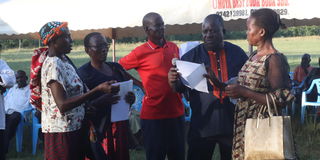
Parents from Kowili clan in Rangwe collect cheques at Ligisa Secondary School on January 28, 2024. The community runs an education support programme where they collect money and help vulnerable students pay school fees.
For members of the Kowili clan in Rangwe, Homa Bay County, the phrases 'unity is strength' and 'united we stand, divided we fall' are not just feel-good slogans. The Kowili clan has vowed to live by these clarion calls to the letter.
Members decided to use their admired unity as a tool to fight poverty. They have come together to form an initiative, where they contribute money to fund the education of needy students in the area.
For two years in a row, the clan, which occupies the lower parts of Kochia Ward in Homa Bay County, has managed to pay school fees for students who were on the verge of dropping out of school due to financial challenges.
Through a programme dubbed Kowili Education Recovery, community members collect funds from friends and well-wishers, which they save in an education kitty and later use to educate needy students in the village.
This year, clan members collected a total of Sh3.3 million, which was used to support at least 561 students.
They are now targeting to collect at least Sh10 million next year to support even more students.
Beneficiaries are in secondary schools, universities and other institutions of higher learning.
Group chairman Kennedy Ogindo said the initiative was launched in 2021 after they realised that a lot of students were struggling to stay in school.
"Some are orphans and have no one to support them. The poverty level is also a concern in the region," he said.
Mr Ogindo added that the area has a huge population with equally high levels of poverty.
"Over time, some parents and guardians find it difficult to pay school fees for their children, leading to a situation where learners are sent home from school from time to time," explained Mr Ogindo.

Kowili Education Recovery chairperson Kennedy Ogindo speaks at Ligisa Secondary School in Rangwe on January 28, 2024, as he presided over the presentation of cheques to help vulnerable students access education. The community-led initiative raised Sh3.32 million to support the education of at least 500 students.
Beneficiaries who were selected this year were issued with cheques at an event held at Ligisa Secondary School on Sunday. A female university student was issued with a cheque of Sh41,700.
She had suspended her education due to financial constraints but reached out to her community for help before she was selected as one of the beneficiaries of the programme. Others received Sh10,000 each.
Beneficiaries from secondary schools, polytechnics and other tertiary institutions got at least Sh 5,000.
Mr Ogindo said the programme managed to offer full scholarships to five Form One students at Ligisa Secondary School after their parents failed to take them to school due to financial challenges.
When sourcing for money, clan elders obtain collection forms from the chiefs' offices. The administrators also oversee the exercise within their areas of jurisdiction.
The elders then engage community members to record their names and give whichever amount of money they wish to donate to support the education of other children.
Group secretary Peter Okello said the money is then kept in the bank in an account run by the community.
"We have four clusters composed of several villages. Some villages managed to collect more money than the rest, but all of it is channelled to a single pool to help vulnerable students," he said.
After collection, community members hold vetting meetings within their villages and select the most deserving cases.
Thereafter the selected names are subjected to approval by the entire village before they are forwarded to the group's officials.
Mr Okello said they only use lists provided by residents.
He said some of the issues considered before being listed as a beneficiary is the level of vulnerability.
"Residents also check if the students have been listed in other support programmes. Beneficiaries should strictly be students who have not benefited from any other education support initiative," Mr Okello said.
The team plans to come up with new rules next year to strengthen the initiative.
Each village will be given a target on the amount of money it should collect.
Mr Erick Joakim, one of the professionals from Kowili said the initiative complements similar support that other agencies and organisations have.
Such support is offered by the National Government Constituency Development Fund (NG-CDF), county government bursary funds, scholarships from banks and the national government's 'Elimu' scholarship.
Mr Joachim said not every deserving student can be listed as a beneficiary in the programmes above.
"We thought it wise to come together as professionals from this community and contribute to help children who may be left out in other education support programmes," he said.
Parents whose children got support expressed gratitude after receiving the funds. Ms Rose Ayieko said her son had not joined Form One because of financial constraints.
"I plan to admit him this week. Without the support, he could have probably stayed at home for an unspecified time," she disclosed.
Nyajanja Secondary School got 360,000 as payment for students in the programme.
God Kado Secondary School received 270,000 while Ligisa Secondary School was awarded sh145,000.
Olare Secondary School had a cheque of sh70,000 deposited to its account while Bakhita Girls Secondary School got 55,000 under the same programme.
Mr Odindo said they project to record increased enrolment in secondary schools next year as students will be supported to be in school even if their patients cannot pay fees.
"We also expect improved academic performance as students will spend most of their time in schools," he said.







